You know how alarming it can be if you’ve ever heard a loud, metallic grinding noise when you try to stop your car. Not only is the noise unsettling, but it’s also a sign that your brakes need repair.
In this post, we’ll discuss what causes grinding brakes and what you can do to fix the problem. We’ll also cover the potential consequences of ignoring the issue and why it’s essential to address it as soon as possible.
There are a few reasons why your brakes may grind when you stop. One of the most common causes is that the brake pads have worn down to the point where the metal backing plate is rubbing against the brake rotor.
When this happens, the metal-on-metal contact creates a grinding noise and can cause damage to both the brake pads and the rotors.
Another potential cause of grinding brakes is a build-up of dirt, rust, or other debris on the brake pads or rotors. This can cause the brakes to stick and create a grinding noise when you try to stop.
Finally, grinding brakes can also be caused by a problem with the brake caliper or brake pads. If the caliper is sticking or the brake pads are not correctly aligned, it can cause the pads to rub against the rotor and create a grinding noise.
Regardless of the cause, it’s important to address grinding brakes as soon as possible. If left unchecked, the issue can lead to more serious problems, such as damaged rotors or a complete failure of the braking system.
By the end of this post, you should understand why your brakes are grinding and what steps you can take to fix the issue.
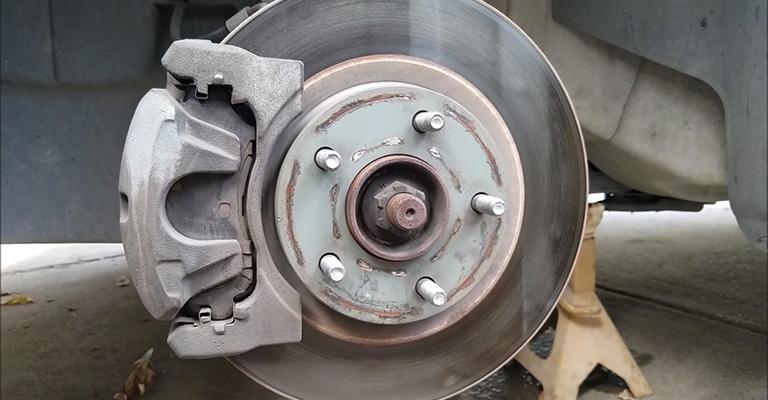
Why Are My Brakes Grinding When Driving?
When you drive, do you hear grinding sounds from your brakes? The rotor and caliper bounce back when rocks or debris bounce off them.
A grinding sound from your car can be downright frightening, especially if it comes from a strange place. The sound associated with grinding brakes is typically gritty and metal-on-metal.
An unpleasant noise to listen to, it certainly has a distinct sound. When you hear this noise, it may mean that the backing plates of your brake pads have been exposed and are now rubbing against the metal of your brake rotors.
In addition to putting you at risk of brake failure on the road, this may damage other parts of your braking system as well. Changing brake pads might be a simple process but ignoring this can lead to much more serious problems.
Regardless of whether you can do the job yourself, you should bring your vehicle to a service center to have a factory-trained technician handle it.
Is It Bad If My Brakes Are Grinding?
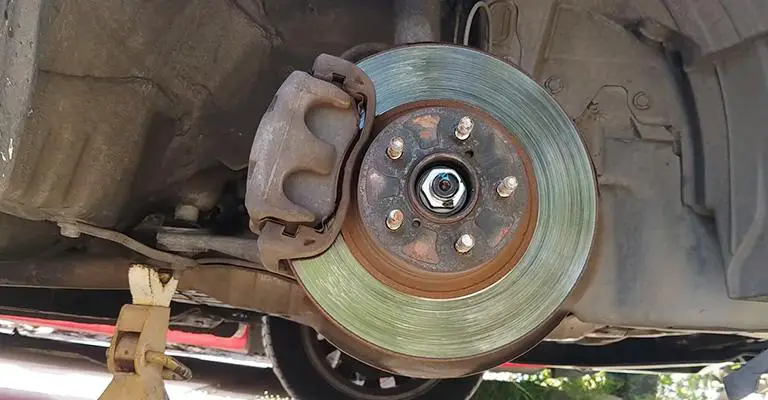
It is possible that brake grinding means something is wrong with your braking system, which can lead to expensive repairs and dangerous situations. According to the National Highway Traffic Safety Administration, faulty brakes may cause vehicle crashes in 25% of cases. Take action!
Possible Reasons Your Car Brakes Make Grinding Noise When Stopping
How long does it take for your brakes to start grinding? Many different factors could contribute to your brakes grinding when stopping, including:
- When you apply full braking force, your brakes may grind, indicating that your Anti-Lock Braking System (ABS) has malfunctioned. Vibrations in the pedal may occur when ABS is activated when you apply the full brakes.
- There could be a sharp grinding noise from the brake disc and calipers if it is sharper. You may also hear a rumble from your pedal as a result of this. In some cases, a brake replacement or disc or rotor replacement may be required.
- Your brake pads are most likely the culprit if you hear grinding noises when you stop or slow down. Eventually, your brake pads will lose their thickness and squeal, or “brake scrub,” when they wear out.
The more your pads wear down, the louder the grind will become. Several other reasons could be involved, including:
Your Brake Caliper Has Debris Inside
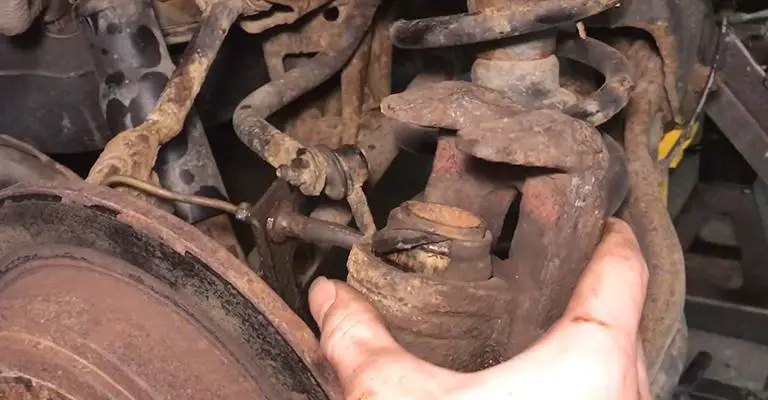
It is possible for something, such as a tiny stone, a piece of crushed rock, or another small object, to become lodged in your brake caliper, creating a continuous screeching or grinding noise.
Your Car Has Not Been Driven in a Long Time
If your vehicle has been idle for months, your brake noise may result from rust. Besides checking your brake fluid, your battery life, and your tires, you should also examine them. It is possible to avoid most major problems listed above if you drive your vehicle at least once a month.
Your Braking System Needs Relubrication
Over time, the brake system’s components will need to be relubricated since the braking system is usually complex. Your car’s brakes can make grinding sounds without proper lubrication since the caliper bolts are exposed to pressure.
The caliper bolts must be secured for the brake calipers to work appropriately. Over time, however, they may rust, causing a grinding noise. If you oil your caliper bolts once a month, you can lengthen their lives. However, caliper bolts are not expensive to replace, with parts costing between $10 and $20.
Low-Quality Brake Pads
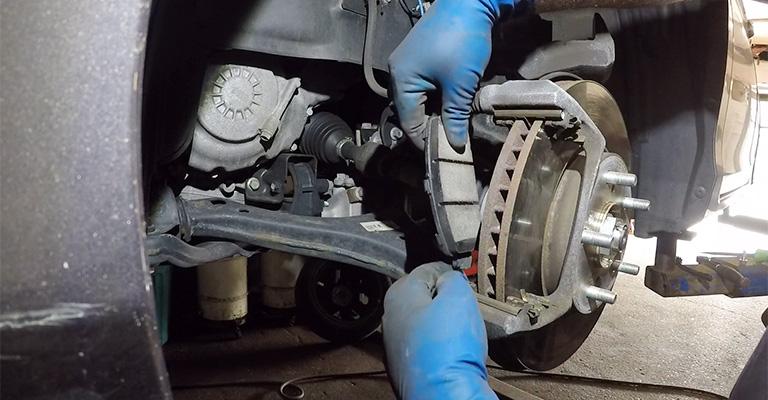
The lowest-quality brake pads may be cheaper but require frequent repairs and wear out other brake components more quickly. Consequently, more affordable brake pads may also produce grinding and scraping sounds when braking because they contain large amounts of metal.
How Grinding Brakes Affect Stopping Power?
You may not know that worn-down brake pads can make stopping your car challenging. Here’s how it works.
As you press down on the brake pedal, brake fluid is sent to the calipers – metal parts attached to your wheels. Calipers squeeze the brake pads, which press against the brake rotors with the help of brake fluid.
The wheels gradually slow down by rubbing the brake pads against the rotors and eventually stop rotating. It is possible that excessively worn brake pads can expose the metal backing, causing rotors and metal to grind against each other when you brake.
You won’t only hear an unpleasant sound when this happens, but your brake rotors will be damaged, your brakes will be less responsive, and they will eventually fail. One of the many brake problems may lower your stopping power when your brake pads and rotors have worn out.
Throughout the life of your car, your brakes can make all kinds of noises, whether or not there are actual problems with them. Therefore, when your brakes begin to “act funny,” it’s important to get a free brake inspection to know the problem, how much attention it needs, and what services you need.
How Long Can I Drive With Grinding Brakes?
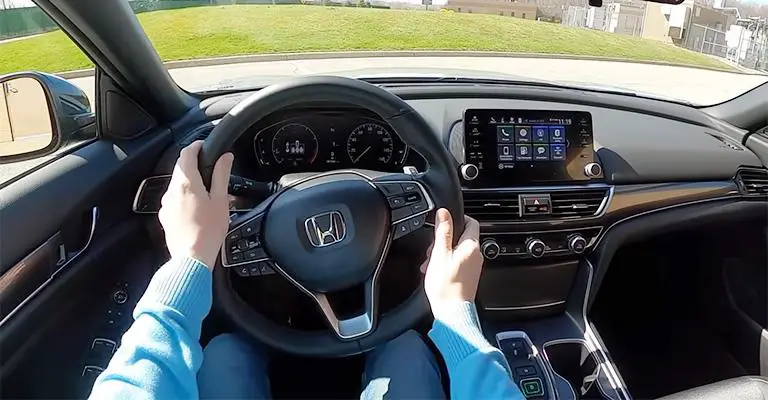
These days, brake pads are equipped with audible warning mechanisms to alert you when the material is worn thin enough to warrant replacement.
It is usually a metal tab mounted on the brake rotor that comes into contact with the brake pads once they have worn thin.
Using the brakes causes the vehicle to screech/grind. Wear indicators, squealers, or screamers are other terms to describe these tabs.
Unless you cause severe damage to your rotors, you are not in immediate danger if you hear unusual noises when you brake.
There’s no way you can procrastinate checking the brakes, as they are liable to cause much more harm than good.
As a last resort, you can usually get your brakes checked immediately if it’s just the warning tabs, but if it’s not, you’d better have them replaced immediately.
If you hear a heavy grinding when braking, you’ve probably worn out the brake pad material completely, and the situation is much more complicated than you might think.
Final Words
In grinding brakes, the pads are pretty much worn off, and the steel backing plates are in contact with the rotors. You can cover hundreds of miles if you continue doing this. Rather than saving money, you are making the repair more expensive by ruining the rotors.
Having your brake system work together correctly can enhance your safety on the road. An expert technician near you can provide you with a free brake inspection to help avoid accidents caused by brake failure.
If your car’s brakes begin to grind, have a mechanic inspect them and replace the brake pads or rotors, whichever is necessary. The cause of grinding noises can vary, and you must identify the exact issue before fixing it.

